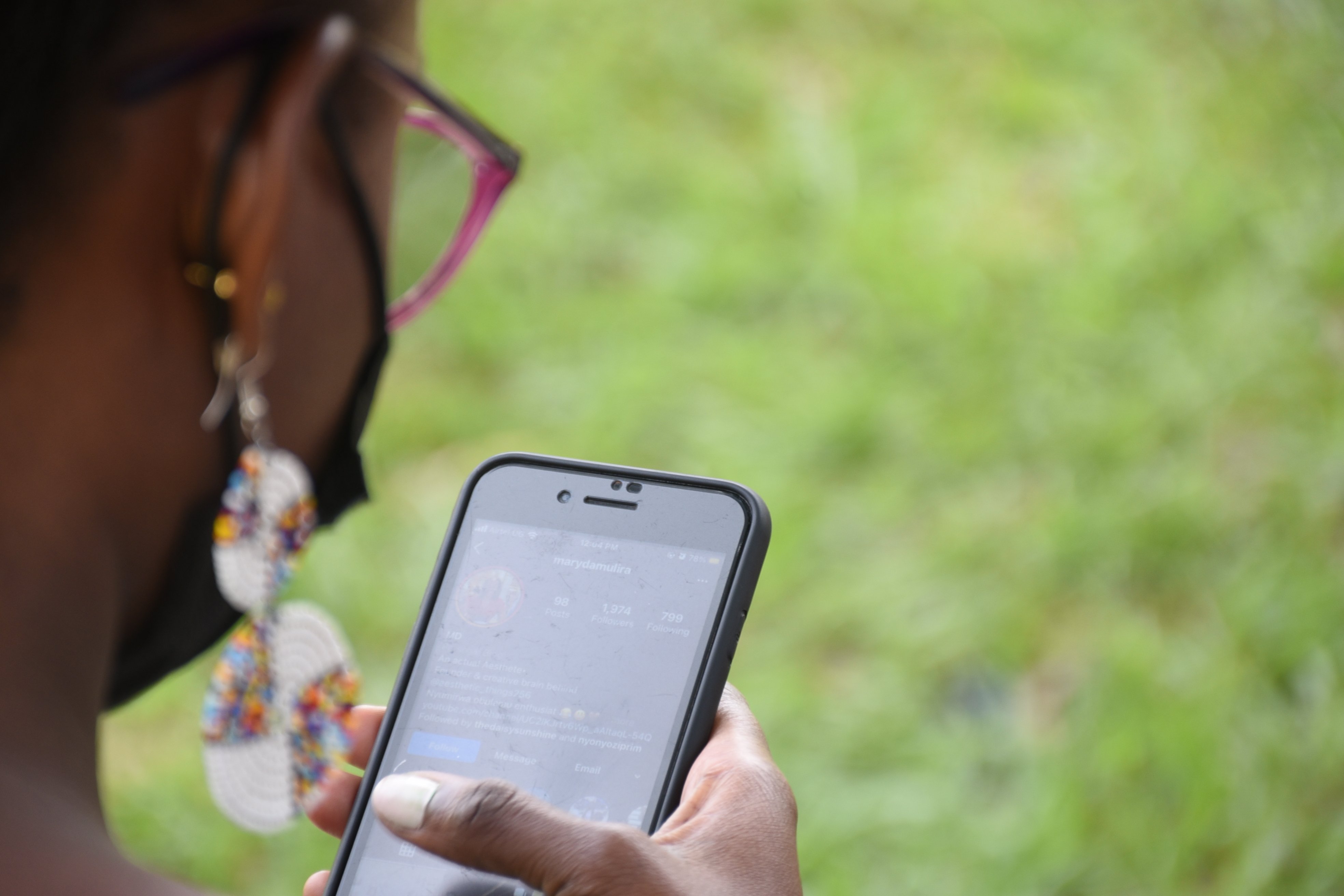Prime
How Ugandans lose millions in mobile money fraud

A woman uses a smart phone. About 3 of every 5 people have encountered fraud attempts or been defrauded at least once according to Uganda Communication Commission. PHOTO /EDGA R. BATTE
What you need to know:
- A total of 4,143 cases of mobile phone theft were reported in 2021 compared to 4,043 cases reported in 2020, showing a 2.4 percent increase.
- Most of the cases were a result of snatching from unsuspecting members of the public according to the 2021/2022 police report.
Be very suspicious whenever you hear the word ‘PIN’ in any phone conversations or text message even if it is someone you know. Better safe than sorry.
The advent of Covid-19 meant that many people went online for education, commerce, entertainment, work and a lot more. But as the traffic increased, thugs also took advantage.
Rising fraud complaints
According to Joseph Kizito, the consumer affairs specialist at the Uganda Communications Commission, fraud issues have largely dominated complaints at the Commission in the last two years.
“We call it an emerging issue. About 3 of every 5 people have encountered fraud attempts or been defrauded at least once, estimated at about 60 percent fraud attempts. The actual cases filed at police are not inclusive because many times complainants chose not to report,” Kizito says adding that some UCC staff are victims.
Sunday (not real name) who prefers anonymity due to the sensitivity of the matter, has an online business where about Shs9 million is transacted through mobile money daily.
“Due to the nature of my job, I am not careless with my personal details. On the 21st March 2022, I was duped of a whole Shs5m,” narrates Sunday.
He had a sick mother in law at Mulago hospital and doctors had been talking about a surgery for which he had to deposit money that week.
“Some of these are inside jobs. They probably listen in to some of our conversations because the fraudster used this very story to rush me into sending the money claiming to be the nurse we had been in touch with at the hospital,” Sunday says.
His plight was not helped much when he tried to followup with police and the telecom company to recover his money.
“It was so tedious and costly because I was required to facilitate some progressive track downs through the investigations. I felt I was exposing myself and work too much at some point. I gave up before the case was closed,” says Sunday.
Sunday is one of the many Ugandans that count their losses and never get to the bottom of the matter.
“I thought the rich are the ones targeted until I started getting suspicious calls. One pretended to be an official of UCC verifying National Identification Numbers. I was told to first switch off my phone for five minutes and then follow the prompts that shall be sent or else my card will be blocked. I simply cut the call,” says Matthew Sekalala, a resident of Ntinda.
The fraudsters also faked being a relative seeking for help, another time sent a message, “I accidently sent you money. Please check your balance and send it back,” another caller claimed to come from one of the biggest telecom companies claiming they are making updates all of which Sekalala did not fall for.
Here are some of the means used to defraud.
Simcard Based
Anyone can buy a card as long as they have a national ID after the passing of the regulation demanding that one must be registered to access a simcard.
“Initially, we had not strengthened investigative and enforcement aspects. Many simcards were on the loose, making it much easier for the fraudsters. But now, no card will be used to commit a crime and be left operational or untracked,” says Kizito.
Stolen phones
“Users are a bit careless with phones using them without pins and storing them in exposed areas. When stolen, either the reporting happens late or not at all. These stolen phones are the easiest and quickest for fraudsters.” Says Kizito.
David Birungi, Airtel’s public relations manager reiterates the need for telecom users to guard their phones, PIN and money more jealously in these times.
“These fraudulent transactions like the authentic ones can only be successful with a PIN. They will hack into your emails just to look for those PINS,” says Birungi.
Loopholes in registration process
Kizito concedes that there was a bit of sloppiness in the registration process which did not account for many scenarios being heighted as the fraud tactics keep emerging.
For instance, one who didn’t have a national ID would have someone with an ID register for them.
“There are speculative reports reaching us that some people have resorted to registering numbers for others at a fee which fraudsters can use to take advantage. We are still investigating this,” says Kizito.
It is one of the areas the commission is raising awareness on. Dial *197# and follow the prompts to verify the numbers registered using your National ID credentials. When a number registered under your national ID is used to commit a crime, you are culpable.
“If you find any strange number go immediately to your operator and report,”says Kizito.
Intervention
An anti-fraud committee has been put in place comprising of UCC the regulator, the police and the operators.
Concerning the handsets the loose end was the country allowing in any kind of device some not type approved by the commission which is now going to be more stringent to limit entrance of illegitimate communication devices into the country.
“This campaign by the private sector, other regulators, KACITA and the media already started about three months ago with stakeholder engagement and a project implementation plan has been worked out.” Kizito says.
Access to UCC
UCC has a complaints mechanism which runs at two levels. Level one the consumer/subscriber reaches the service provider directly.
In case the consumer is not satisfied with the redress they have been given, or with the way their complaint has been handled then that issue can be reported to the commission which is level two.
One can call the toll free line 08002277, walk in or use social media handles.
“We would like to emphasize that UCC NEVER calls consumers for any reason,” Kizito notes.
Recommendations
Telecom companies never call their consumers for any form of verification and or update or upgrade. When in doubt dial 100 and seek clarification.
Incase of suspicious calls take the following actions:
- Hang up immediately – Do not give the fraudster a chance to manipulate you through engagement.
- When it is about your family, hang up and verify with other sources or members of your family.





